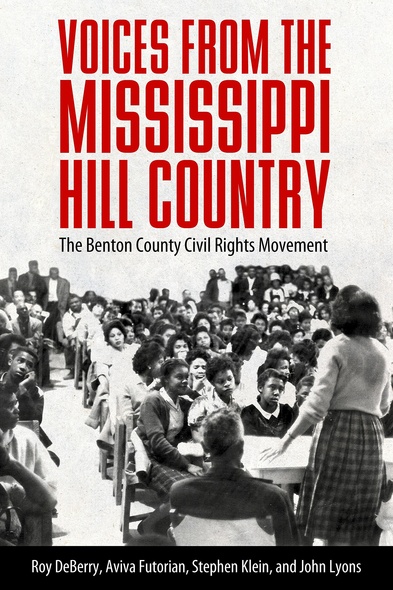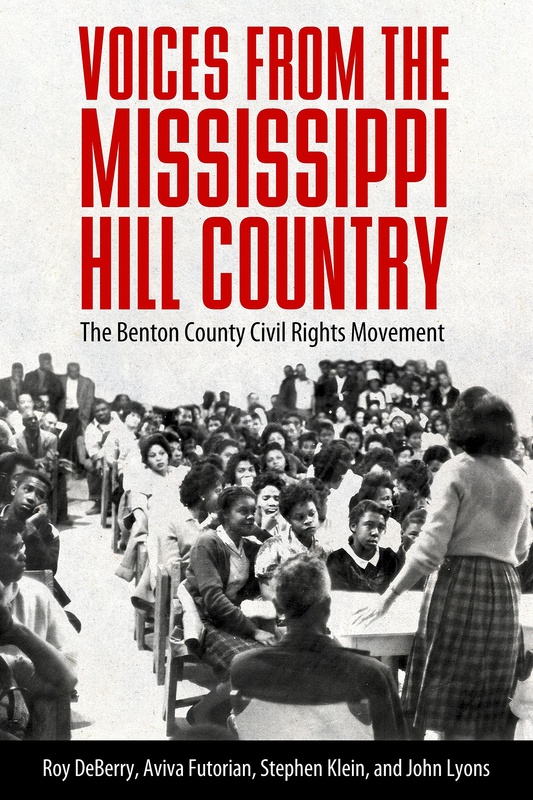
Voices from the Mississippi Hill Country
The Benton County Civil Rights Movement
Voices from the Mississippi Hill Country is a collection of interviews with residents of Benton County, Mississippi—an area with a long and fascinating civil rights history. The product of more than twenty-five years of work by the Hill Country Project, this volume examines a revolutionary period in American history through the voices of farmers, teachers, sharecroppers, and students. No other rural farming county in the American South has yet been afforded such a deep dive into its civil rights experiences and their legacies. These accumulated stories truly capture life before, during, and after the movement.
The authors’ approach places the region’s history in context and reveals everyday struggles. African American residents of Benton County had been organizing since the 1930s. Citizens formed a local chapter of the NAACP in the 1940s and ’50s. One of the first Mississippi counties to get a federal registrar under the 1965 Voting Rights Act, Benton achieved the highest per capita total of African American registered voters in Mississippi. Locals produced a regular, clandestinely distributed newsletter, the Benton County Freedom Train.
In addition to documenting this previously unrecorded history, personal narratives capture pivotal moments of individual lives and lend insight into the human cost and the long-term effects of social movements. Benton County residents explain the events that shaped their lives and ultimately, in their own humble way, helped shape the trajectory of America. Through these first-person stories and with dozens of captivating photos covering more than a century’s worth of history, the volume presents a vivid picture of a people and a region still striving for the prize of equality and justice.
Voices from the Mississippi Hill Country: The Benton County Civil Rights Movement provides a nuanced view of poor Blacks’ impact on the civil right movement…this book’s organization and participation with its subjects are just as inspiring as the stories. Future researchers and general readers will gain fresh ways to conduct, collect, and convey poor yet impactful Black voices.
The success of the civil rights movement in Mississippi rose up from the strongly held desire of local people to create change. Voices from the Mississippi Hill Country: The Benton County Civil Rights Movement provides a window into how those deemed powerless found a way to exert their rights as citizens in a hostile and isolated landscape. Most important of all, the stories and people in this book expand the narrative of Mississippi’s civil rights movement in a way that is both moving and significant.
Here are stories to hearten and inspire you—stories from ordinary people whose extraordinary courage and determination changed their community forever. These first-person accounts come from just one small county in the northeast corner of the state, but together their voices add rich specificity, depth, and texture to the history of Mississippi’s civil rights movement. Voices from the Mississippi Hill Country is an essential complement to Local People, John Dittmer’s magisterial statewide account of that heroic struggle.
Voices from the Mississippi HillCountry provides absorbing testimony from older residents on lynchings, Ku Klux Klan intimidation, the abject humiliation of Jim Crow segregation, and a sharecropping system that proved a useful substitute for slavery. But during the 1960s, Benton County blacks seized the initiative, sending their children to previously all-white schools while risking their livelihoods and lives to register and vote. Although conditions today are far from ideal in this poor rural county, we hear encouraging reports from black elected officials as well as college graduates returning to work in their communities. The interviews in this book are at once heartbreaking and uplifting. We all have much to learn from the courage and perseverance of the local people of Benton County, and to Futorian, DeBerry, and their associates for bringing their stories to life.
My ancestors were enslaved in northern Mississippi, and I grew up in Chicago surrounded by those who migrated from there. Hearing the type of stories that are captured in Voices from the Mississippi Hill Country was part of my childhood. This important book captures the pride, spirit of self-determination, bravery, and resilience of a people who fought against systematic oppression and exploitation in ways big and small. That sense of dignity and pride in the face of danger is a testament to the human spirit that cannot be destroyed by threats or laws. This moving collection is raw, real, and authentic with the voices that too often are left out of the American story.
Roy DeBerry is executive director of the Hill Country Project and a veteran of the Mississippi civil rights movement. A Brandeis alum, he has a doctorate in political science and was formerly the vice president for economic development and local governmental affairs at Jackson State University. Aviva Futorian is chair of the Hill Country Project and a Chicago-based human rights lawyer who currently works on prison reform issues. She became a SNCC organizer in 1964, when she first traveled to Benton County and met DeBerry. Stephen Klein was formerly with the US Agency of International Aid and has a background in energy and development policy and has been traveling to Benton County for several years. John Lyons is a filmmaker, teaching artist, and arts education administrator in Chicago who first made the trip to Benton County in 2003 to record the oral histories of local residents celebrating a civil rights reunion.





